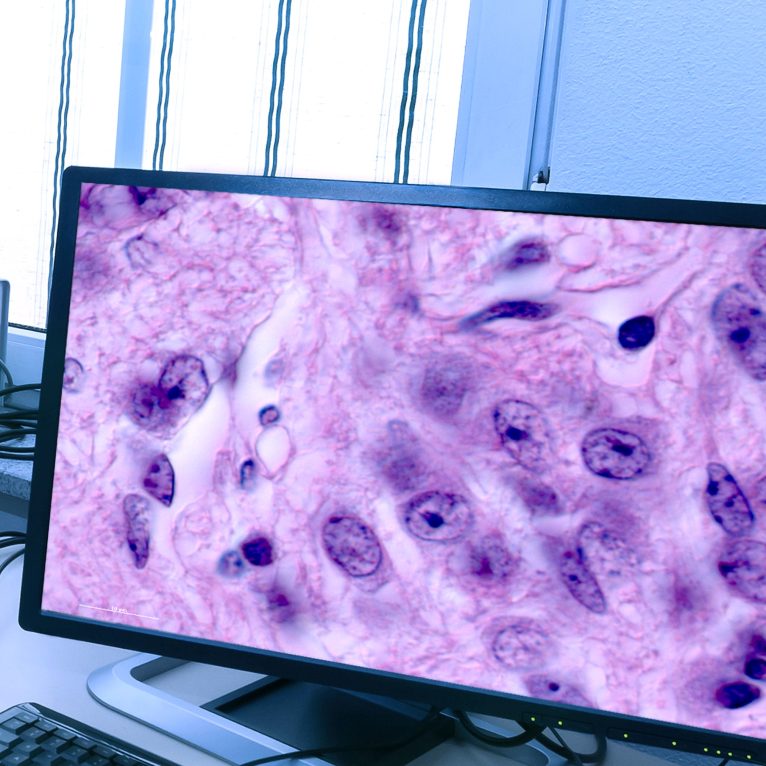
Written by

Cranfield, UK, 9th October 2024, Written by Imogen Fitt – Hello everyone, I hope we’ve all recovered from ESMO and ECP!
If you haven’t managed to travel and connect with the industry recently, you can read a few of my thoughts on the state of the digital pathology market in an ECP review here.
Beyond that, I’ve also been busy publishing Signify Research’s fourth edition of our Digital Pathology Core Market Report – if you find this news round-up useful and would like to understand better how the industry will develop in the future, drop me a note and we can discuss how access to our research can benefit you.
September’s news monthly news round-up is below:
- We kicked off this month with Aiforia Technologies announcing it had partnered with Assistance Publique–Hôpitaux de Paris (AP-HP) to implement the former’s prostate AI solutions into clinical routine with the support of the regional Health Agency of Île-de-France. This comes off the back of specific funding to initiate studies into the use of AI in clinical care in Paris, the results of which are expected to provide evidence to support wider deployment across France. AP-HP specifically noted in the press release that it aims to eventually extend AI usage across all its pathology departments, a great signal for continued use!
- Proscia and Smart Reporting GmbH then partnered to have the latter company join Proscia Ready and integrate SmartReports, a structured reporting tool, into Proscia’s IMS. A recent insight I published on the evolution of digital pathology software listed structured reporting as an important precision medicine tool within our competency model, and that’s because structured reporting supports generating standardised medical reports, usually based on predefined templates, which allow data contained therein to be more easily compared and analysed at scale. Such analyses will be integral to getting a better understanding of diseases in Real-World Data (RWD) studies to help enable a more personalised approach to medicine. Smart Reporting already has an established presence in the Imaging IT ecosystem, especially in radiology, and has recently been featured in our enterprise imaging expert Jake Bennett‘s comprehensive Imaging IT Round-up – well worth a subscription if you’d also like to know more about radiology and cardiology IT!
- Next, Mindpeak GmbH announced it has expanded its portfolio by releasing a new product for Gleason score grading in prostate cancer diagnostics. The product was co-developed in partnership with Clinsight Analytics, marking yet another co-development partnership in digital pathology AI made this year. Vendors have such a vast array of potential products to develop that in the past many strategies were shaped by ad-hoc partner and client requests. However, as the industry matures and is shifting towards more of a strategic approach, it’s also recognising that no single company will dominate the workflow on its own. Co-development partnerships thus present an ideal solution to raise newer profiles quickly, reduce risks in development, and bring competitive products to market faster.
- After that, Paige followed up by introducing Alba, a multimodal AI-powered ‘co-pilot’ focused on supporting oncology diagnosis. Alba assists pathologists by providing real-time insights and analyses. Interestingly, the press release mentioned that the product would be used to support pathologists, oncologists, and multidisciplinary clinical teams whilst having additional applications in clinical trials management – which suggests the company may be exploring ways to access funds outside of the comparatively poorly funded pathology lab…
- After that Proscia made another announcement introducing a RWD solution available on its Concentriq® platform. The tool integrates over 10 million pathology images with clinical and genomic data offering life sciences organisations the opportunity to gain access to de-identified patient data to support drug development. The announcement marks a significant step as IMS platforms evolve to become the interface between research and clinical environments. Eventually, these platforms will not only act as facilitators enabling access to RWD but will also acts as deployment platforms for pharma-developed digital companion diagnostics.
- Roche has expanded its digital pathology open environment to offer access to over 20 more AI algorithms from Deep Bio Inc., DiaDeep, Lunit Oncology, Mindpeak GmbH, Owkin, Qritive, Sonrai, and Stratipath. Looking at the range of algorithms on offer, some have asked – why is Roche offering similar products on its platform? There are a few angles to this: firstly some algorithms have been trained on different clones, such as PathAI‘s PD-L1 with 28-8 and Lunit’s PD-L1 with 22C3; looking beyond that, I’d point out the stance this is displaying towards interoperability. Since a clear trend impacting customer purchasing of IMS software is the preference towards freedom of choice, partnering with vendors offering algorithms of similar applications clearly promotes Roche’s stance on this issue. Indirectly, Roche’s wider business is also likely to influence its priorities within digital pathology which points towards ulterior motives?
- Beckman Coulter Diagnostics and Scopio Labs have expanded a partnership to include the latter company’s Full-Field Bone Marrow Aspirate (FF-BMA) application alongside its existing haematology offering. The partnership between both companies originally began in 2023, when the two announced a new end-to-end automated haematology solution by connecting the DxH 900 Workcell and DxH Slidemaker Stainer II with Scopio Lab’s X100HT high-throughput digital cell morphology platform and application for peripheral blood smear analysis. This expansion effectively signals the success of the partnership so far – great news!
- Our final news pieces concern new funding rounds raised – congratulations to PictorLabs Inc which announced a $30M Series B round! The round was led by Insight Partners with renewed funding from M Ventures (the venture capital arm of Merck Group. In addition PathPresenter raised $7.5M in funding led by AVANT BIO, with participation from Barco NV and Modi Ventures. Funding in the digital pathology market has ramped up over the summer for several digital pathology companies but as Signify Research Ltd‘s analysis has shown in other markets, funding is often a mere stepping-stone towards market success. Get in touch to discuss how other vendors in adjacent healthtech markets have successfully navigated these challenges.
That’s all for this month but do subscribe to receive regular updates.
We can discuss how Signify Research’s support can:
- Inform your growth targets and product investment strategy with quantitative data points.
- Support you in evaluating digital pathology’s emerging competitive landscape to assess the impact of announcements and select potential partners.
- Understand adjacent markets such as enterprise imaging and laboratory information systems and the influence these will have on Digital Pathology adoption.
About Imogen Fitt
Imogen joined Signify in 2018 as part of the Healthcare IT team. She holds a 1st class Biomedical Sciences degree from the University of Warwick where her studies included molecular biology and pharmacology. Since joining the team Imogen has studied the medical imaging software and hardware markets and is now expanding Signify Research’s Diagnostics and Lifesciences coverage.
About the Diagnostics and Lifesciences Team
The Diagnostics and Lifesciences team provides market intelligence and detailed insights on the multiple healthcare technology markets where the clinical world intersects with the preclinical. Our areas of coverage include digital pathology, laboratory information systems, clinical Real-World Data (cRWD) platforms, oncology information systems, tumour board software, oncology decision support software and radiotherapy IT. Each report provides a data-centric and global outlook of its markets with granular country-level insights. Our research process blends primary data collected from in-depth interviews with healthcare professionals and technology vendors, to provide a balanced and objective view of the market.
About Signify Research
Signify Research provides healthtech market intelligence powered by data that you can trust. We blend insights collected from in-depth interviews with technology vendors and healthcare professionals with sales data reported to us by leading vendors to provide a complete and balanced view of the market trends. Our coverage areas are Medical Imaging, Clinical Care, Digital Health, Diagnostic and Lifesciences and Healthcare IT.
Clients worldwide rely on direct access to our expert Analysts for their opinions on the latest market trends and developments. Our market analysis reports and subscriptions provide data-driven insights which business leaders use to guide strategic decisions. We also offer custom research services for clients who need information that can’t be obtained from our off-the-shelf research products or who require market intelligence tailored to their specific needs.
More Information
To find out more:
E: enquiries@signifyresearch.net
T: +44 (0) 1234 986111
www.signifyresearch.net
